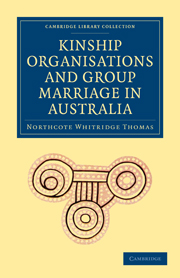Book contents
- Frontmatter
- PREFACE
- Contents
- BIBLIOGRAPHY
- INDEX TO ABBREVIATIONS
- CHAPTER I INTRODUCTORY
- CHAPTER II DESCENT
- CHAPTER III DEFINITIONS AND HISTORY
- CHAPTER IV TABLES OF CLASSES, PHRATRIES, ETC.
- CHAPTER V PHRATRY NAMES
- CHAPTER VI ORIGIN OF PHRATRIES
- CHAPTER VII CLASS NAMES
- CHAPTER VIII THEORIES OF THE ORIGIN OF CLASSES
- CHAPTER IX KINSHIP TERMS
- CHAPTER X TYPES OF SEXUAL UNIONS
- CHAPTER XI GROUP MARRIAGE AND MORGAN'S THEORIES
- CHAPTER XII GROUP MARRIAGE AND THE TERMS OF RELATIONSHIP
- CHAPTER XIII PIRRAURU
- CHAPTER XIV TEMPORARY UNIONS
- APPENDIX: ANOMALOUS MARRIAGES
- INDEX OF PHRATRY, BLOOD, AND CLASS NAMES
- INDEX OF SUBJECTS
- Plate section
CHAPTER XI - GROUP MARRIAGE AND MORGAN'S THEORIES
Published online by Cambridge University Press: 05 February 2012
- Frontmatter
- PREFACE
- Contents
- BIBLIOGRAPHY
- INDEX TO ABBREVIATIONS
- CHAPTER I INTRODUCTORY
- CHAPTER II DESCENT
- CHAPTER III DEFINITIONS AND HISTORY
- CHAPTER IV TABLES OF CLASSES, PHRATRIES, ETC.
- CHAPTER V PHRATRY NAMES
- CHAPTER VI ORIGIN OF PHRATRIES
- CHAPTER VII CLASS NAMES
- CHAPTER VIII THEORIES OF THE ORIGIN OF CLASSES
- CHAPTER IX KINSHIP TERMS
- CHAPTER X TYPES OF SEXUAL UNIONS
- CHAPTER XI GROUP MARRIAGE AND MORGAN'S THEORIES
- CHAPTER XII GROUP MARRIAGE AND THE TERMS OF RELATIONSHIP
- CHAPTER XIII PIRRAURU
- CHAPTER XIV TEMPORARY UNIONS
- APPENDIX: ANOMALOUS MARRIAGES
- INDEX OF PHRATRY, BLOOD, AND CLASS NAMES
- INDEX OF SUBJECTS
- Plate section
Summary
The arguments for group marriage in Australia are of two kinds—(1) from the terms of relationship, that is to say of a mixed philological and sociological character, and (2) from the customs of the Australian tribes.
The argument from the terms of relationship is so intimately connected with the theories of Lewis Morgan that it may be well to give a brief critical survey of Morgan's hypotheses. I therefore begin the treatment of this part of the subject by a statement of Morgan's views on the general question of the origin and development of human marriage.
As a result of his enquiries into terms of relationships, mainly in North America and Asia, Morgan drew up a scheme of fifteen stages, through which he believed the sexual relations of human beings had passed in the interval between utter savagery and the civilised family. We are only concerned with the earlier portion of his scheme. It is not even necessary to discuss that in all its details. Morgan's first eight (properly five) stages are:
I. Promiscuous Intercourse.
II. Intermarriage or Cohabitation of Brothers and Sisters.
III. The Communal Family (First stage of the Family).
IV. The Hawaian Custom of Punalua, giving the Malayan Form of the Classificatory System.
V. The Tribal Organisation, i.e. totemic exogamy plus promiscuity, giving the Turanian and Ganowanian System.
VI. Monogamy.
- Type
- Chapter
- Information
- Kinship Organisations and Group Marriage in Australia , pp. 110 - 118Publisher: Cambridge University PressPrint publication year: 2010First published in: 1906



